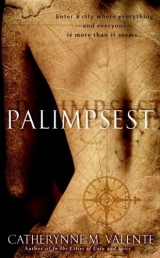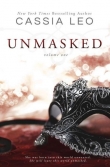
Текст книги "Palimpsest"
Автор книги: Catherynne M. Valente
Жанр:
Классическое фэнтези
сообщить о нарушении
Текущая страница: 3 (всего у книги 19 страниц)
PART I:
INCIPIT LIBER DE NATURIS BESTIARUM
ONE
THE FLAYED HORSE
Sei woke with the grassy, half-rotten smell of ryokan-tatami in her nose and her face streaked with tears. She immediately tried to go back to sleep, to catch the herons, fading already, but alas—sleep lost is sleep lost. She felt a weight on her wrists, like the memory of heavy bracelets. Her second thought was to find Sato Kenji, to shake him and bite his mouth and ask him if he had written a book about the city, too, if she could press it against the other, which lay still in her backpack, cold and black. When would he fly north again to Tokyo on their sleek white serpent? Tomorrow? Never? In what car might he wait for her? Useless, she decided, to ask.
She dressed without thinking about it much, took two rice-balls—one stuffed with salted plum, one with salmon—and Sato Kenji’s little book with her, and fled the milling, noisy hostel into the city. Kyoto was designed on the pattern of a Go board, by imaginative and impish urban planners who surely drank a great deal. As she progressed from square to square, staring vacantly at the thick cypress bark rooftops and leering Fu dogs, Sei felt strange, floating. She was a smooth white disc, clapped on all sides by slippery black pieces, reflecting the sky, helpless, with the Shinkansen on one hand and the endless pavilions of Kyoto on the other.
She chose the Silver Pavilion out of all the temples. It had been her mother’s favorite, and so, like an inheritance, was hers. It was shaded in autumn leaves so bright the trees seemed to bleed. The persimmons were so golden they hurt her eyes, and the sun stabbed at her through the blazing fruit. She had a terrible dry taste in her mouth, as though she had drunk too much, though she had had nothing but water since Tokyo.
The temple grounds were deserted. She settled onto the grass a ways off from the great silver temple. She watched it, how dark and mottled its silver leaf was, centuries of tarnish which the monks, in their inscrutable perambulations, had never polished, settling on the holiness of obscured metal. It looked like the crouched and looming house of a succubus from one of her mother’s books. She almost expected some yellow-eyed monster with wings of patchworked sin to snap open the door and screech some infernal koan at her. Yet Sei liked the mossy, irritable temple, which seemed honest, unflappable, like an old, hunchbacked elephant.
She opened Kenji’s book on her lap and flipped through the pages. She did not want to read this book from start to finish, or rather, she thought perhaps it did not want her to. Instead she practiced the art of bibliomancy, trusting the book to show her what it wanted her to know.
In Osaka, I heard a very strange account of the antique initiation rituals of conductors. I was told by a retired man who was adamant I not reveal his name that before the war, when new conductors were assigned their first train, they were brought on board on a very cold winter’s night when the train was stopped and no one lingered in the cars. The senior engineers gathered tightly in the conductor’s cabin. They put the earnest young man’s hands onto the control console and anointed them with viscous oil from the engine before pulling loose several wires and tying them into knots around the man’s fingers. He was then told the secret name of the train, which he could reveal to no one. They cut into the third finger of his left hand, mingling his blood with the oil, which was then returned to circulation in the engine. In this way the train became the beloved of the conductor, and the man who told me this story said that it felt very much like a grave wedding service.
Sei’s hands throbbed, feeling the open, oil-spattered wires beneath her own hands, a phantom console alive beneath her. The wind picked up and rustled her blue hair, blowing it over her cheeks. She might have remained in such a pose until the sun slid away below the tin rooftops, her hands frozen over the book, had a young woman not sat down next to her without warning, still dressed in her school uniform, her hair hanging in a long, loose braid. Sei started and scowled, but she uttered nothing, as manners demanded.
“It’s funny,” the young student said casually, in the authoritative, overeager tone of a local girl speaking to a tourist, her accent unmistakably Kyoto. She turned to Sei, her face open and attentive as a cat’s. "The Golden Pavilion is the famous one, but it only ever looked yellow to me. It’s ugly, just kind of garish. All that gold, and it just looks like yellow paint. But the Silver Pavilion . . . nobody cares, it's not a big tourist draw, and if you didn't know, you might not even think it was silver—the tarnish is so thick it matches the cypress bark on the roof. Doesn’t it look sad and run down? But it seems realto me, and the Golden Pavilion seems . . . well, it’s belligerent, thinking it’s so beautiful. Arrogant old bitch.”
Sei blinked.
“My name is Yumiko,” the girl said helpfully.
Sei frowned further. “I haven’t been to the Golden Pavilion yet,” she said, handing over her grudging answer like bus fare. Yumiko shook her dark head.
“If you do, you’ll see what I mean.”
Yumiko was silent then. She stared at Sei for a long while before grinning, wiping her palms on a blue plaid skirt, and extending her tongue slowly, as far as it could reach, nearly grazing the tip of her delicate chin. Sei gaped; blood rushed to her cheeks. She saw it there, on the red flesh of the girl’s tongue, whipped with wind: Kenji’s mark, the grid of lines, the map, blazing blue-bright.
“What isthat?” she cried, leaping up from the grass. The black book tumbled to the ground. “Tell me!”
Yumiko closed her mouth with a gentle little sound. “Don’t you know?” she said, her brow creased as a page.
“No, of course not, how could I?”
The girl stood, her braid slipping entirely loose, and stood very close, so close they might have kissed. She reached for Sei’s blouse and began to slide the buttons from their stitched eyelets. Sei pushed her away, but Yumiko smiled.
“Please,” she murmured.
Yumiko opened the crisp black shirt like a theater’s curtains. There, on Sei’s skin, were the strange dark lines, snaking across her sternum, arcing slightly onto the curve of her breasts. It seemed as though a great insect had attached itself to her, to suckle and grow.
Yumiko did not step away. She cradled Sei’s face in her manicured hand and leaned back, stretching, a smug, satisfied cat.
“I would like to be a novice here,” she said airily. “I would like to live in the temple and drink bamboo tea every day, and eat only seven grains of rice until I was thinner than the Buddha and twice as beautiful. I would leave clean water for the sacred cats and sweep the rushes and the red leaves aside in the fall. I would smell the sake breweries in the winter, and eat one persimmon a year, on the Emperor's birthday. Every morning and every evening, I would cut a square from one of my kimonos and with it I would polish the walls until the tarnish fell away like an old woman's hair, until it gleamed like water. After a year I would be naked and polish the walls with my own hair, and under my body it would look like a house hollowed out of the moon.”
Sei stared.
“What happened to me?” she whispered. “Who are you?”
“What happens to any of us? Novices all.”
“That’s not an answer! How did you know? Just walking up to a stranger in a temple, how did you know I had that thing on me?”
“It’s not a thing, you know. It’s . . . like a ticket. And once you’ve bought your ticket, and been to the circus, ridden the little red train, then you can sort of see other people who’ve done it, too. They . . . walk a certain way. Smell a certain way. Their whole body becomes like an accent. And you always recognize your own accent. I recognized you.”
Sei’s cheeks burned. She looked at the grass, and then at the sky. She didn’t want to ask, like some stupid club girl begging for drugs, or a child begging for the candy she just knows will make her life complete.
“How do I get back there?”
Yumiko looked at her sideways, puzzled, as though Sei should know this, as though she had asked how to count to ten– basic stuff, kid! Who brought you up?But Yumiko sidled close and lowered her voice until it was no more than a dragonfly’s cough. She let her lips brush Sei’s ear. “Come with me. Peregrine and 125th is on my tongue. I’ll meet you there. We’ll take the subway to the end of the world!”
She kissed her then, and the Silver Pavilion glowed dully behind them. Yumiko slid her hand under Sei’s skirt and pressed her fingers against her urgently, furtively—there was no one around them, but the sun was frosty and white on them, and they were so bare. Sei opened her legs to allow the girl’s hand inside her and shut her eyes against the warm air, the red leaves, the silver temple. She could not draw breath for the taste of sassafras and rum in Yumiko’s mouth, the sharpness of her small white teeth. Sei felt herself flip over—white to black, disappearing into the board, lost.
125th and Peregrine
SEI DREAMS AGAINST HER TATAMIthat night of an intersection garlanded with black flags fastened to string with clothespins of mother-of-pearl. On the north corner: a cartographer’s studio. Pots of ink hide in every crevice, parchment spreads out over dozens of tables. A Casimira pigeon perches in a baleen cage and trills out the hours faithfully. Its droppings are pure squid-ink, and a little tin trough collects them dutifully. Imogen and Philomena have run this place since the last cartographer went mad and began eating telegraph tape like pasta. Philomena with her silver compass draws the maps, her exactitude radiant and unerring, while Imogen illuminates them with exquisite miniatures, dancing in the spaces between streets. They each wear dozens of watches on their forearms.
This is the second stop, after the amphibian salon, of Palimpsest’s visitors, and especially of her immigrants, for whom the two women are especial patrons. Everyone needs a map, and Philomena supplies them: subway maps and street maps and historical maps and topographical maps, false maps and correct-to-the-minute maps and maps of cities far from this one. Look—for this lost child she has made a folding pamphlet that shows the famous sights: the factory, the churches, the salon, the memorial. Follow it, girl, and you will be safe!
Each morning, Philomena places her latest map on the windowsill like a fresh pie. Slowly, as it cools, it opens along its own creases, its corners like wings, and takes halting flight, flapping over the city with susurring strokes. It folds itself, origami-exact, in midair: it has papery eyes, inky feathers, vellum claws.
It stares down the long avenues, searching for mice. This is the life cycle of Palimpsest fauna.
Yumiko leans against the door post, holding her arms out like a sister who had never hoped to see her dear one again. She is not wearing her schoolgirl’s dress any longer, but a red scrap that clings to her waist like a spool of yarn pulled tighter than breathing. With a local girl’s surety she guides Sei inside—a little scalloped bell chimes, and Imogen looks up from her parchments with a stern face, her black hair soft around a neck just slightly too long for a woman to wear in company.
“The trains,” Sei murmurs. “I need a map of the trains. A . . . schedule.”
Imogen produces a tiny booklet, hardly larger than her hand, with a design on the cover like an infinite tangle of wires compacted into a disc. Yumiko pays her with a fingernail cut quickly and fed to the pigeon. The cartographer smiles, and when she does, her face breaks open, smooths and unfolds into a heartbreaking beauty.
Her map clutched to her breast, Sei runs out into the street, her hair streaming behind her like a smokestack’s exhalation. She looks desperately around her, her breath quick and hoarse.
She finds it on the south corner: lit globes, covered with thick wrought-iron serpents which break the light, of a subway entrance. Trains barrel along at the bottom of the stairs every fifteen minutes. On the glass platform below stands Adalgiso the Apostle-Fingered, playing his viola with six fingers on each hand. He is bald, with a felt hat that does not sit quite right on his head. Beside him is Assia, the Nymph of the Phonograph. She is singing tenor, her smoke-throated voice pressing long kisses against his strings. His playing is so quick and lovely that the trains stop to listen, inclining on the rails and opening their doors to catch the glissandos spilling from him. His instrument case lies open at his feet, and each passenger who takes the Marginalia Line brings his fee—single pearls, dropped one by one into the leather case until it overflows like a pitcher of milk. In the corners of the station, cockroaches with fiber-optic wings scrape the tiles with their feet, and their scraping keeps the beat for the player and his singer.
Sei dashes down the steps into darkness and the metallic smell of the subterranean palaces of transportation before Yumiko can catch her. She stops short before the viola player and his tenor, and their eyes meet like magnets clicking together over the vibrating strings of his instrument.
_______
Miles away, on a street planked in cedar, a beekeeper cries out—her vision has gone dark, and all she can smell is the wet blackness of the underground.
TWO
THE UNHAPPY ROOK
Things which are gone in the morning: sleep, darkness, grief, the moon. Women. Dreams.
November sat cross-legged in her bedroom, a bare, white place she would never have thought to compare to her stacked hives but which nevertheless was cousin to them, those sixteen calm, angular spaces.
On her lap was a wide blank book with rough-chewed edges, which she would never have thought to compare to her fingers, her thrice-dyed, badly cut hair, her chapped lips, but which nevertheless was sister to these things: the woman, the raw flesh, the small white room. She was possessed of a self as bare as the month her parents met, the month of her own name, a core fashioned from stark wood and a prescience of snow.
In the book she had written, hesitantly. Her handwriting had been long ago corrupted: the vagaries of overzealous typing and an adolescent passion for calligraphy. What remained was a ruin of pens pressed too deeply and sweeping capitals too uncertain to be majestic. She had sketched out the morning list without thinking, desperate to list her morning bed, empty as a coffee cup, used up, dry, to fold it into a kind of column that made sense of the depression where once Xiaohui lay, which was still warm with her.
The keeping of lists was for November an exercise kin to the repeating of a rosary. She considered it neither obsessive nor compulsive, but a ritual, an essential ordering of the world into tall, thin jars containing perfect nouns. Enough nouns connected one to the other create a verb, and verbs had created everything, had skittered across the face of the void like pebbles across a frozen pond. She had not yet created a verb herself, but the cherry-wood cabinet in the hall contained book after book, jar after jar, vessel upon vessel, all brown as branches, and she had faith.
And so she did not think that she was lonely, or as her mother would have said, drawn up into herself like an old turtle, simply that she was absorbed in a greater task than the wrangling of humans and the collecting of large houses or automobiles. She moved in long lines between her books, along her lists like ranked soldiers, administrating, shaping, carving with her quick, corruptible hands.
November tasted the ink of her pen lightly. Acorns and copper. Ash.
She had dreamed heavily and the dream clung to her still—November had always been a prodigy of dreams. Her father, a librarian, had made her write them down, and perhaps this had been the beginning of the slim brown books which now numbered so very many. She dreamed in color, more than color, in shades of gold and scarlet impossible in the waking world. She dreamed in languages she did and did not know, she dreamed strange and wonderful faces, narratives of recursive complexity, and her recall was meticulous, detailed, perfect as a list.
There had been such a smell in the place of her dream, of sassafras and the sea, bay leaves and dandelion seeds blowing wild, of coffee plants, of sweat. The smell burned into her; she had striven after it in the way of dreams until she could hear the starry surf on a bright shore.
The following things are essential to a city, she wrote. She crossed out essentialand wrote necessaryabove it in compressed script. She did not erase or begin again—mistakes were as essential to the noun-stacks, the combs of names, as industry to a city. They showed that the stack was not arbitrary, that some words had been excised in favor of others, that choices had been made, casualties counted.
Industry, she wrote below it. Commerce. Transportation, construction, tenements. Habitation. Suburbs. Circuses. Exhibitions of Force and Fervor. Religion. Ritual.
Darkness, grief, the moon. Women. Dreams.
_______
The skin of her cheek recalled pressing against the legs of the lost Xiaohui. November mourned, as much as she could ever mourn those gone in the morning, in her kitchen, at a red table, with a white cup full of milky coffee. She held her palm against her face—she was not sorry the historian had gone, but her body wept. She stared into her coffee, sitting in a thin blue dress that tangled in her calves. She often felt that she chased the ideal cup of coffee in her mind from table to table, the rich, thick, creamy coffee, spicy, bittersweet, that betrayed no hint of thinness or chemical flavoring, nothing less than total, fathomless devotion to the state of being itself. Every morning she pulled a delicate cup from its brass hook and filled it, hoping that it would be dark and deep and secret as a forest, and each morning it cooled too fast, had too much milk, stained the cup, made her nervous.
She wore copper rings that turned her fingers green, and tapped them idly against her cup. Her book of lists lay closed on the table, and she considered briefly a roll of the attributes of the grail-coffee which did not fill her cups, but could not, in the end, decide it had sufficient worth. The bees would be no help; they would tumble over each other like golden babies and thrum wordlessly on the subjects of queens and sex and pollen-gluey feet.
November, like a queen in a story, with black hair and a long story ahead of her, was possessed of a beautiful mirror that had belonged to her mother. Its frame was oily iron, figured in broken fleur-de-lis and curling leaves. She kept it near the door of her little house, for it was only when she meant to go into the world that she cared how the world might see her.
Her face showed faithfully on that morning, ringed with baroque foliage: a messy knot of hair, a mild brown gaze—and a black mark like a slap on her cheek, an explosion of lines and angles like the work of a furious spider or a drunken architect, brachiating from a point near her ear up towards the corner of her right eye and down towards the crease of her lip, long, undulating lines like the banks of a black river. She put her hand against it, shaking—rubbed at it, but it remained, a mark like the one on Xiaohui’s vanished thigh, hot, as though only just branded there.
Things that are left in the morning: memory, thought, snow. Light. Work. Disease. Dreams.
November returned to the Chinatown café and the soupy peppered oysters, the greasy, soft fortune cookies, but Xiaohui was not there. She briefly considered becoming a hermit, a nun, a bee-abbess. She was halfway there already, really. She could not hide her face as Xiaohui had hidden her leg, and the toll-taker at the crux of the gloomy gray bridge had stared so long that the cars behind her had blared indignation. But the wizened woman at the café counter, Xiaohui’s mother, her wrinkled hands clamped up in rings so old their metals had gone black, did not stare. She looked up at November through blue-white hair and allowed the smallest smile, as if in broad, universal pity, the way Mary smiles when she is the star of the sea. November blushed—what she had done blazed as plain as a pregnancy. She offered no excuse, and the crone said nothing.
She shrugged a little, as if to say: That’s what you get for sleeping with strange women.
Slumped into her plates, November swallowed the happy steam of onions, shrimp paste, plum sauce. She sat separated by two tables from her lone fellow patron—a young man with glasses and a glossy willow-colored button-down shirt. He ate deftly and she thought his hands had a woman’s grace, or a beekeeper’s. He was reading a book with a black cover and embossed silver characters. When he reached up to turn the onionskin page, November saw that his forefinger was black from nail to palm, wound around with those broken, swerving lines, haphazardly, as if drawn with a terrible, shaking pen.
He would look up eventually, he had to. She was patient—nothing she could say would cry out in the same shrill pitch as her ruined face. Her blood beat like a bruise blossoming, and she willed him to see her, to abandon his book and raise up his eyes. While she waited for him, her folded cookie arrived, and she unfolded it with great care. She could hear so much blood in her ears, more blood and thicker than she could have had in her. On the thin slip of sugared paper she read:
I am sorry. My daughter is also careless.
As if a bell had rung in his ear, the man in willow-green looked up—and smiled, beatifically, light opening across his face like a window flung open at noon. His dark eyes flashed recognition, and in two quick strides he reached her table, casting a green shadow. He took her face in his hands and kissed her mouth hard, clumsily, a disaster of teeth and skin.
212th, Vituperation, Seraphim, and Alphabet
IN THE CENTER OF THE ROUNDABOUTsits the Memorial. It is tall and thin, a baroque spire sheltering a single black figure—a gagged child with the corded, elastic legs of an ostrich, fashioned from linked hoops of iron. Through the gaps in her knees you can see the weeds with their flame-tipped flowers. She sits in the grass, her arms thrown out in supplication. Bronze and titanium chariots click by in endless circles, drawn on tracks in the street, ticking as they pass like shining clocks. Between her knock-knees is a plaque of white stone, blank as a cheek. Once, on this spot, one thousand and twelve hearts stopped without a gasp. An army wrangled without screams, without sound. In the center of the roundabout, the ostrich-girl died unweeping while her father had his long throat slashed with an ivory bayonet. The great post-war sculptor Lydia Weckweet, who is responsible for so many of the small and lovely renderings that grin or frown at innumerable corners and cornices in the city, remembered her little face, made still and hard and old by death, and so too remembers all of Palimpsest who pass by her on their way to night-fast and the stockades.
_______
November stumbles across the tracks, tripping on their glittering rails, blind, the smell of train-catacombs in her nose, the smell of things that crawl, but also things that race and never cease. She falls into the arms of the iron ostrich-wastrel, hanging on her bolted neck, shuddering as the traffic clatters around her in an endless circuit, like breath, like blood. Under her hands she feels the heft and shape of strange great scissors with wet handles, but her fingers are empty. Under her mouth she tastes a bitter woman with nails in her tongue, but she is alone. The beekeeper hunches in the half-circle of the orphan’s outflung hands, rocking on her heels, her fists pressed up against her eyes.
A soft thing falls onto her feet. The feel of it is familiar. The infinitesimal motion, the golden weight. She hears, through the din of the sensations that pit her hands against her eyes, a dim, welcome thrum, a hum like a heartbeat, and November laughs amid the wheeling cars and far-sung indignant squawks of drivers she cannot see. She seeks out the little weight and scoops it into her palm—and in that action she can also feel herself diving from a long boat, and also gripping a woman by her hair, such hair, shining and bristling as she knows the tiny creature in her grip to be, though she still sees nothing but black, but endless tunnels, but shadows angular and impenetrable.
She brings the bee to her lips; its wings hush against her. Slowly, as if to prove the deliberateness of its small deed, the creature presses its stinger into November’s mouth, pauses for a moment on the tip of her tongue, stiff against the taut flesh of it, and then eases into her, piercing her tongue deftly and perishing in a paroxysm of venom and religious ecstasy.
In answer to her cry, a second bee arrives, and a third, floating at her fingertips like hopeful wedding bands, golden and bright. November’s vision clears as the bee-venom forks through the meat of her tongue, and the underground recedes, claws at the periphery, rings her sight like the iris of an old movie camera. She takes in the Memorial, the blank plaque, the night sky waving with palm fronds, the streetside’s tangled red manzanita branches. The carriages are flashes of scarlet or silver, curtained, small worlds she cannot enter. But the bees tip her fingers, and there are ten now; they skip away and return, buzzing encouragingly, and she knows when a creature beckons her if she knows anything at all.
She steps off the Memorial. There are bees at her feet, now, too. The carriages part to let her by, and November feels, somewhere far off, tears on cheeks that are and are not hers.
_______
Down the mahogany alleys of Seraphim Street the bees lead her, now hundreds in number, a buzzing triumphal march at her back. Clothes shops line the spotless, polished road. In the window of one is a dress in the latest style: startlingly blue, sweeping up to the shoulders of a golden manikin. It cuts away to reveal a glittering belly; the join is fastened with a cluster of tiny cerulean eyes that blink lazily, in succession. The whites are diamonds, the pupils ebony. The skirt winds down in deep, rigid creases that tumble out of the window in a carefully arranged train, hemmed in crow feathers. The shopkeeper, Aloysius, keeps a pale green Casimira grasshopper on a beaded leash. It rubs its legs together while he works in a heap of black quills, sewing an identical trio of gowns like the one in the window for triplet girls who demanded them in violet, not blue.
At night, he ties the leash to his bedpost and the little thing lies next to his broad, lined face, clicking a binary lullaby into the old man’s beard. He dreams of endless bodies all in a row, naked, unclothed and beautiful.
_______
The bees spiral through the door of this shop, which has no bell, for this is a far place and such things are as old-fashioned as egg creams, and dive as one into the expanse of a lavender suit with a high cravat fashioned from a glossy green banana leaf and pinned by a clutch of pear-seeds. Its cuffs are wide and black, its chest crossed by a complex and voluminous sash of plantain leaves. The bees fill it utterly, pouring feet from its trousers and a solemn, thronging, buzzing head from its neck. The head totters and rights itself, pitting eyes and half a mouth into its sphere. Aloysius, mouth full of bone needles, wobbles on his stool and gapes; his grasshopper dances rapturously on its lead.
“Please,” he spits, “I don’t want any of thathere. Immigrants are to keep to the secondhand stores, don’t you know!”
The bee-manikin gnashes its ersatz teeth at the wizened tailor, and he cringes. November starts to apologize, but the lavender suit clasps her up in its arms so quickly it defeats the words in her mouth. It embraces her like a brother, and she can feel countless tiny bodies wriggle against her. She leans her head on its shoulder, not a queen but a mate, a maid, a whore in the kingdom of the bees, luring the workers from that singular distended belly and all its promise of gold. The manikin swoons.
“Where am I?” she whispers: finally, that first and last and most obvious of questions. Aloysius wrinkles his red and pockmarked nose in distaste.
“I will not,” he hisses to the bees. “How unutterably boring. She’s new as a wound. I don’t have to.” He spits at her, gripping the thick upper edge of his paisley cummerbund with veiny knuckles. The saliva explodes against her in a shower of glass beads.
The bees roar, but November holds up what she hopes is an imperious hand, trusting desperately in their love, in her place within the long and splendid list of things which bees adore: the queen, roses, hyacinth, comb, air, apple trees, jelly, the color red, herself, herself, keeper and mistress and bride in virginal white.
They freeze, fall silent, stare expectantly at her through the empty, bee-swarmed gaps in the hive-head tilting atop its crisp cravat. November puts her hands on the tailor’s face, holding up his cheeks, withered as a wasp’s nest. Her gaze is solemn and wide, her hold on him tender.
“Don’t try that nonsense with me, girl. I’ve had more women than you’ve ever met.”
But she says nothing. This is just a dream, really,she thinks, and in dreams nothing is forbidden.
“Sleeves,” she sighs, and her voice is thick with poison and warmth. “Skirts, inseams, legs. Collars, cuffs, belts, bustles.” She strokes his thick white hair and presses her face to his. “These are things that have touched a thousand bodies in place of your hands, in place of your kisses and your worship. These are the things that have stroked their bellies and their throats and lay alongside them in the dark.”
The bee-golem grins blackly and gives a shuffling leap of delight. Victorious, they pull at the peacock feathers of the dress in the window. Aloysius just watches November, and she can feel his judgment: her hair is too coarse, striped dull, washed-out violet against dyed black. Her eyes don’t match the dress either, mottled gray-green. But he wants to obey, whether her or the bees she cannot tell, and soon enough her pale, soft belly shows through deep blue cloth, her body moves beneath the silk proxy-hands of Aloysius and a regiment of bees sweeps up her hair, smooths her scalp with their loving feet.








